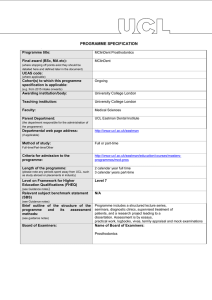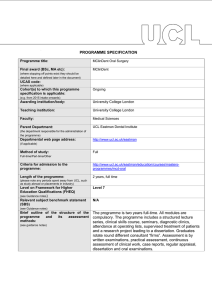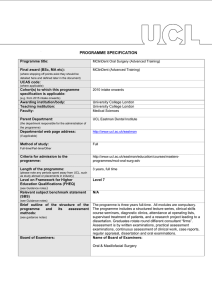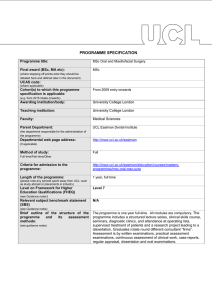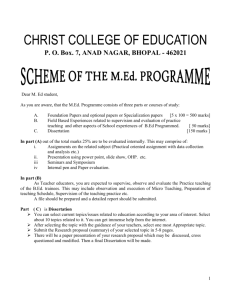PROGRAMME SPECIFICATION Programme title: Final award (BSc, MA etc):
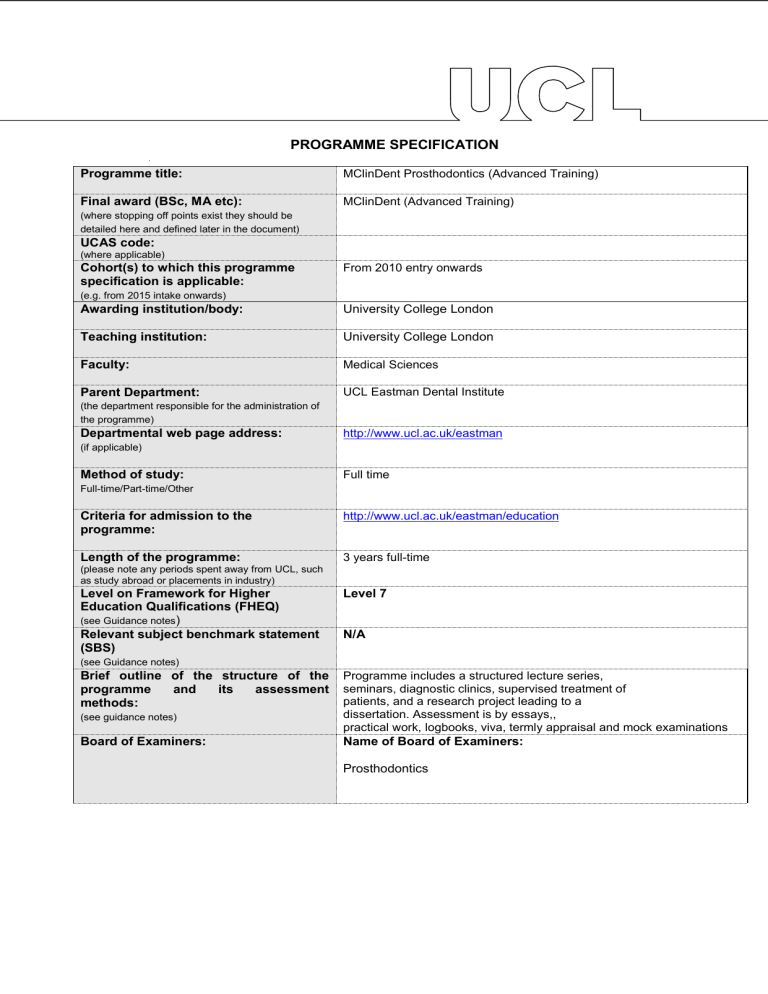
Board of Examiners:
PROGRAMME SPECIFICATION
Programme title:
Final award (BSc, MA etc):
(where stopping off points exist they should be detailed here and defined later in the document)
UCAS code:
(where applicable)
Cohort(s) to which this programme specification is applicable:
(e.g. from 2015 intake onwards)
Awarding institution/body:
Teaching institution:
Faculty:
Parent Department:
(the department responsible for the administration of the programme)
Departmental web page address:
(if applicable)
Method of study:
Full-time/Part-time/Other
Criteria for admission to the programme:
Length of the programme:
(please note any periods spent away from UCL, such as study abroad or placements in industry)
Level on Framework for Higher
Education Qualifications (FHEQ)
(see Guidance notes )
Relevant subject benchmark statement
(SBS)
(see Guidance notes)
Brief outline of the structure of the programme and its assessment methods:
(see guidance notes)
MClinDent Prosthodontics (Advanced Training)
MClinDent (Advanced Training)
From 2010 entry onwards
University College London
University College London
Medical Sciences
UCL Eastman Dental Institute http://www.ucl.ac.uk/eastman
Full time http://www.ucl.ac.uk/eastman/education
3 years full-time
Level 7
N/A
Programme includes a structured lecture series, seminars, diagnostic clinics, supervised treatment of patients, and a research project leading to a dissertation. Assessment is by essays,, practical work, logbooks, viva, termly appraisal and mock examinations
Name of Board of Examiners:
Prosthodontics
Professional body accreditation
(if applicable):
Faculty of General Dental Practitioners
Specialist Advisory Committee (as part of specialist training) for Restorative
Dentistry.
EDUCATIONAL AIMS OF THE PROGRAMME:
Date of next scheduled accreditation visit: N/A
The aim of the MClinDent Prosthodontics (Advanced Training) Programme is to extend knowledge of Fixed and Removable
Prosthodontics to prepare the candidate for a career in specialist practice. Three components of the Programme are designed to accomplish this aim:
Supervised clinical and laboratory practice in which treatment planning, clinical procedures and technical work are performed for selected cases, including a number of complex treatments.
A programme of seminars, practical classes and other didactic sessions commencing with a full-time introductory course and reviewing the clinical and scientific scope of the subject to determine its evidence base.
A research investigation leading to a dissertation in which the candidate is required to demonstrate the application of scientific method to a problem of relevance to Prosthodontics.
PROGRAMME OUTCOMES:
The programme provides opportunities for students to develop and demonstrate knowledge and understanding, qualities, skills and other attributes in the following areas:
A: Knowledge and understanding
Knowledge and understanding of:
Fixed and Removable Prosthodontics to a specialist level
Teaching/learning methods and strategies
Lectures, seminars, closely supervised clinical teaching sessions and consultant clinics
Intellectual (thinking) skills:
Treatment planning and clinical problem solving
Research planning/protocol writing
Assessment:
Essays
Unseen mock written papers
Viva voce
Termly academic and research progress assessments through internal graduate appraisal process
B: Skills and other attributes
Teaching/learning methods and strategies:
Supervised clinical work
Diagnostic clinics
Journal clubs
Dissertation
Viva voce
Self-directed learning is encouraged by regular essay writing.
Assessment:
Supervised clinical work
Mock ‘unseen’ patient examination
Dissertation viva voce appraisal process
Practical skills (able to):
Demonstrate clinical treatment skills
Demonstrate diagnostic skills
Apply skills in a clinical scenario
Carry out a research project
C: Skills and other attributes
Teaching/learning methods and strategies:
Supervised clinical work
Diagnostic clinics
Dissertation
Transferable skills (able to):
Library skills
IT skills
Presentation skills
Self-directed learning
Assessment:
Supervised clinical work
Mock ‘unseen’ patient examination
Dissertation viva voce appraisal process
D: Skills and other attributes
Teaching/learning methods and strategies:
Dissertation
Journal club
Oral presentation of research
Assessment:
Dissertation
Oral presentation of research viva voce appraisal process
The following reference points were used in designing the programme:
the Framework for Higher Education Qualifications:
( http://www.qaa.ac.uk/en/Publications/Documents/qualifications-frameworks.pdf
);
the relevant Subject Benchmark Statements:
( http://www.qaa.ac.uk/assuring-standards-and-quality/the-quality-code/subject-benchmark-statements );
the programme specifications for UCL degree programmes in relevant subjects (where applicable);
UCL teaching and learning policies;
staff research.
Please note: This specification provides a concise summary of the main features of the programme and the learning outcomes that a typical student might reasonably be expected to achieve and demonstrate if he/she takes full advantage of the learning opportunities that are provided. More detailed information on the learning outcomes, content and teaching, learning and assessment methods of each course unit/module can be found in the departmental course handbook. The accuracy of the information contained in this document is reviewed annually by UCL and may be checked by the Quality Assurance Agency.
Ailbhe McDonald Programme Organiser(s)
Name(s):
Date of Production:
Date of Review:
Date approved by Chair of
Departmental Teaching
Committee:
Date approved by Faculty
Teaching Committee
July 2010
December 2015
December 2015
December 2015
